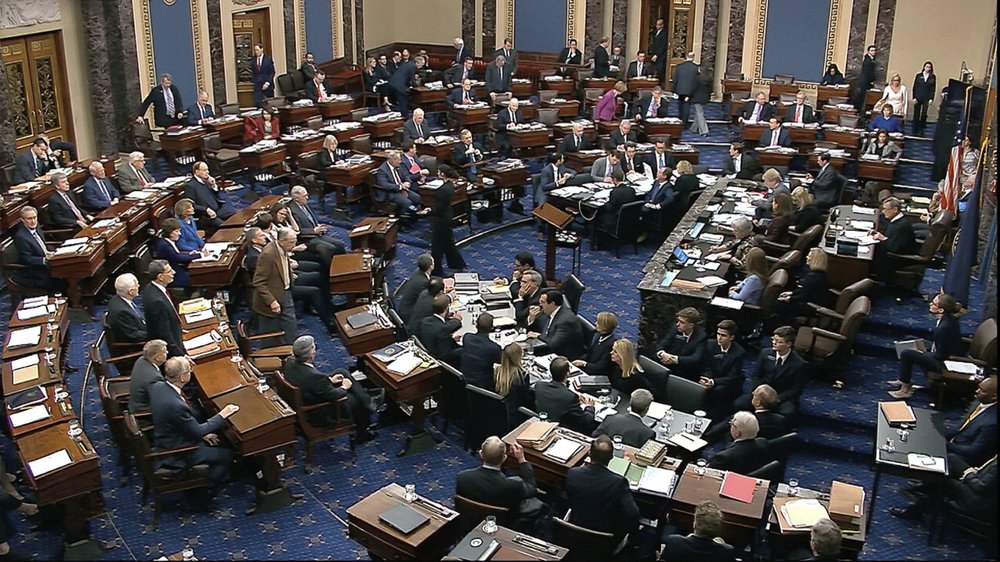
No Witnesses In Impeachment Trial: Close Senate Vote Signals Trump Will Likely Be Acquitted Soon
READ ON
BY BRIAN NAYLOR & BOBBY ALLYN
The Senate has voted not to call witnesses in the Senate impeachment trial of President Trump. The vote was 51 to 49 against witnesses.
Democrats had pleaded for two weeks to hear from witnesses, especially former national security adviser John Bolton. But Republicans resisted.
The vote was not a surprise, following announcements from key Republican senators that they would not be supporting witnesses. Sens. Lisa Murkowski of Alaska and Lamar Alexander of Tennessee said they do not need to hear testimony, which would prolong the trial.
It is still unclear how quickly the trial could wrap up.
There has been speculation that the Senate may hold off voting on whether to remove or acquit the president until next Wednesday, a day after Trump is slated to give his State of the Union address.
Senate Minority Leader Chuck Schumer, D-N.Y., however, told reporters he had not reached any agreement with Majority Leader Mitch McConnell, R-Ky., on such a timetable.
“There is no agreement between Leader McConnell and myself,” Schumer said. “I know there were some reports that there was. But we Democrats are united in saying we do not want this rushed through.”
The “no” votes
Democratic House managers’ hopes of calling witnesses who could have proved damaging to Trump were dashed even before a vote on the motion.
Alexander announced his decision not to join the Democrats’ effort on Thursday; Murkowski’s statement came Friday before the Senate trial resumed.
The looming acquittal for the president was long anticipated, but the roadblock on witnesses still marks a striking setback for Democrats, who at times appeared hopeful that they would be able to persuade enough Republicans to join them in voting to call witnesses, thereby prolonging the trial if not the altering its outcome.
Murkowski made clear on Friday that she did not want an extended trial.
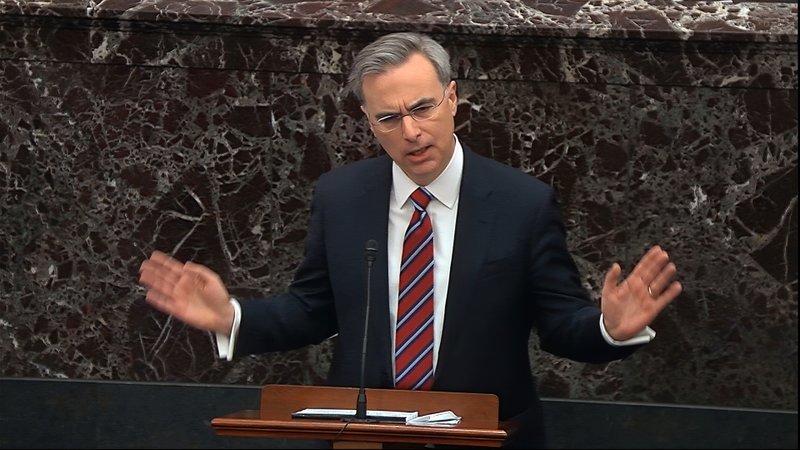
White House counsel Pat Cipollone speaks during the impeachment trial against President Donald Trump in the Senate, Jan. 25, 2020. CREDIT: Senate TV via AP
“Given the partisan nature of this impeachment from the very beginning and throughout, I have come to the conclusion that there will be no fair trial in the Senate,” Murkowski said in a statement. “I don’t believe the continuation of this process will change anything. It is sad for me to admit that, as an institution, the Congress has failed.”
Alexander gave a different rationale: He argued that he had enough evidence that Trump acted inappropriately — but he does not think the president’s actions are impeachable. “If you’ve got eight witnesses saying that you left the scene of an accident, you don’t need nine,” he told NPR on Friday.
House manager Adam Schiff, D-Calif., has argued that if witnesses were to be called, the process would take no longer than an additional week.
Not so, said Trump attorney Jay Sekulow. In his closing argument, Sekulow said the president’s attorneys would want to call many of the witnesses who testified during the House impeachment inquiry.
“This isn’t going to happen, if witnesses are called, in a week,” he said.
The Bolton factor
The president faces two articles of impeachment: abuse of power and obstruction of Congress related to accusations that he held up military aid to Ukraine until the country announced investigations into potential political rival former Vice President Joe Biden and his son Hunter.
Former national security adviser John Bolton has been mentioned as a witness after reports describing portions of his forthcoming book in which he purportedly verifies those accusations.
When the Senate trial resumed Friday, Schiff immediately read into the record a New York Times story that reported on a new revelation in Bolton’s manuscript.
According to the Times, Bolton says Trump told him in early May to call Ukraine’s president to set up a meeting with Trump lawyer Rudy Giuliani to discuss an investigation into the Bidens. Bolton says that among those in the Oval Office meeting with Trump and Bolton was White House counsel Pat Cipollone. Cipollone is now leading Trump’s defense team.
“You will recall Mr. Cipollone suggesting that the House managers were concealing facts from this body. He said all the facts should come out,” Schiff told senators. “Well, there is a new fact which indicates that Mr. Cipollone was among those who are in the loop. Yet another reason why we ought to hear from witnesses.”
Trump denied the account in a statement provided by the White House.
“I never instructed John Bolton to set up a meeting for Rudy Giuliani, one of the greatest corruption fighters in America and by far the greatest mayor in the history of NYC, to meet with President Zelenskiy. That meeting never happened,” he said.
NPR has not reviewed the manuscript.
Next steps
Senators on Friday are holding four hours of debate equally divided between House managers prosecuting the case and Trump’s defense lawyers.
Afterward, a vote will be held on a motion to consider evidence or witness testimony. The Democratic caucus needs four Republicans to defy their party in order to succeed, and Alexander’s and Murkowski’s decisions to vote with their party all but guaranteed that the witnesses will not be part of the trial.
Sen. Susan Collins, R-Maine, on Thursday announced that she plans to vote for hearing witnesses, writing: “I believe hearing from certain witnesses would give each side the opportunity to more fully and fairly make their case, resolve any ambiguities, and provide additional clarity.”
A spokeswoman for Sen. Mitt Romney, R-Utah, said on Twitter that Romney “wants to hear from Ambassador Bolton, and he will vote in favor of the motion today to consider witnesses.”
With 53 Republicans, 45 Democrats and two independents who caucus with Democrats, there is the prospect of a 50-50 vote on whether to call witnesses. Such a vote would fail, and Roberts is seen as unlikely to insert himself into what is essentially a political process.
Democrats, who have maintained throughout the trial that a proceeding without witnesses and evidence would not be a fair process, sought Thursday to undercut the president’s likely imminent acquittal.
Schumer said a trial “without the evidence, without witnesses and documents would render the president’s acquittal meaningless,” adding Trump’s impeachment trial will have a “giant asterisk next to it, because the trial was so rigged in his favor.”
Related Stories:
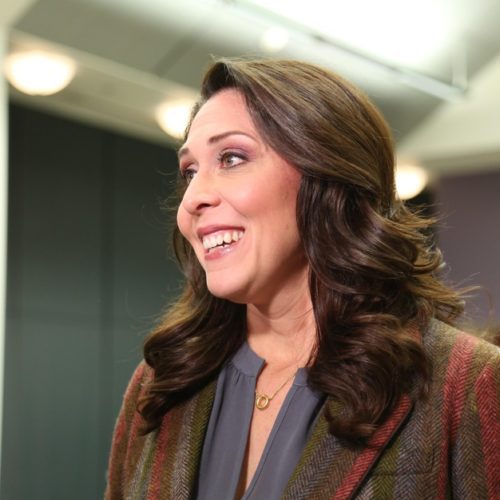
After Speaking Out, Washington Rep. Jaime Herrera Beutler Heads Toward Clash With Her Own Party
Rep. Jaime Herrera Beutler thrust herself into the national spotlight on Friday when the Washington Republican came out with a stunning account of Donald Trump’s actions on the day of the Capitol insurrection. In a statement put out on the eve of the vote in Trump’s Senate impeachment trial, Herrera Beutler said that House Minority Leader Kevin McCarthy told her that in a conversation with the then-president on Jan. 6, Trump appeared to side with the mob, telling him the rioters were “more upset about the election than you are.”
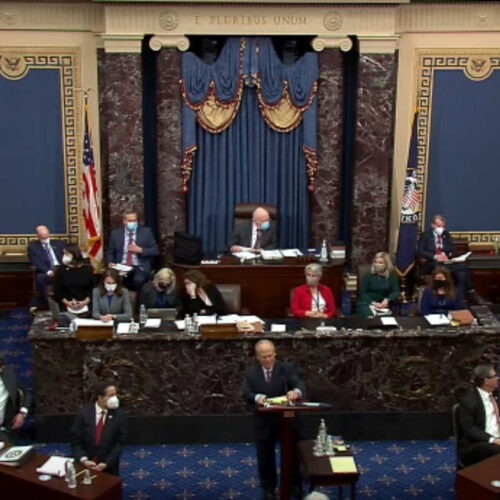
Senate Votes 57-43 On Impeachment Charge, Not Enough To Convict; 7 GOP Vote ‘Guilty’
A majority of senators voted to convict Trump — 57 to 43, including seven Republicans. But two-thirds, or 67 votes, is needed to convict. It was the second time Trump was acquitted in an impeachment trial. The seven GOP senators who voted to convict Trump Saturday were: Bill Cassidy of Louisiana, Susan Collins of Maine, Richard Burr of North Carolina, Lisa Murkowski of Alaska, Mitt Romney of Utah, Ben Sasse of Nebraska and Pat Toomey of Pennsylvania.
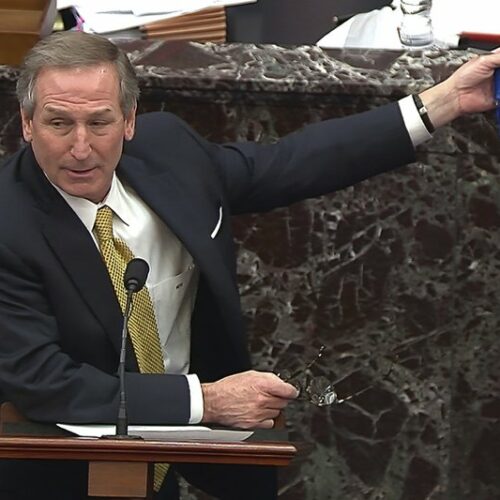
Impeachment Trial Day 4: Trump’s Team Wraps Case In Under 3 Hours, Focuses On Free Speech
Attorneys for former President Donald Trump presented a speedy defense argument Friday in the Senate impeachment trial, using less than three hours to make the case the proceedings were a partisan smear campaign by Democrats, and that Trump should be acquitted because his call to “fight” the election was a figure of speech protected by the First Amendment.















